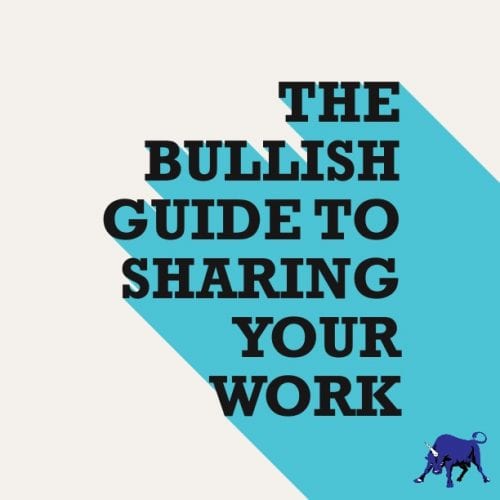This article is more than ten years old. It originally ran on a now-defunct website called The Gloss, where Bullish got its start. This post was created entirely by humans, as AI didn’t exist back then (but also: why would you want to read something no one could be bothered to write?) For more recent posts, try here.
I am writing this column at 1:55 in the morning, drinking a Hoegaarden, before I catch a 10am train to Boston for a 7pm gig. You can take the bus from NYC to Boston for $15, but I paid over $100 for the train (damn you, Amtrak!) because I get a lot done on trains and planes, and four hours on a train will be enough to submit the final chapter of a textbook from my hotel just before heading over to the venue.
For some reason, the train back to New York was even more expensive, so I’ll surely be doubly motivated to write enough to make sure I make a profit on my mode of transport. I also calculate ROI in foreign countries — not that I’m against just enjoying a vacation (see Bullish: How to Travel Like a Gentlewoman). But when alone, I monumentally enjoy sitting in a Swedish cafe, writing math problems and contemplating that my herring platter is being paid for tenfold while I am eating that very herring platter and scribbling away on a legal pad that may now be inadvertently imbued with aquavit and lingonberries.
Let’s talk about how to do everything you ought to be doing in this world, all of it at once.
I’m not talking about multitasking. People always object when told this, but multitasking is a myth. Of course, nearly everyone thinks that she is the exception. Multitaskers feel that they are gliding on double rainbows of productivity and awesomeness, and yet, studies show that those people are incompetent! Multitasking people suffer a ten-point IQ drop, worse than that suffered by marijuana smokers.
While defenders of multitasking point out that you can multitask if the tasks are very, very different (i.e., thinking through problems in the shower), that’s not what I want to talk about today. I want to talk about doing one thing at a time on an hour to hour basis, but allowing your life to grow bigger and richer and more deliciously complicated and rewarding than the lives of the people around you who simply neglect to stretch and leverage themselves. Maybe you really can be a ballerina/firefighter. Maybe you can make $100K at your job, and then one day just casually mention that your side business makes another $100K. Wouldn’t that be sweet?
Here are some ideas.
1. Exploit Economies of Scale
I co-run an adult spelling bee, and periodically I send event listings to websites and magazines. At various times, I’ve been hired to run events for other organizations. It is not twice as hard to do twice as many event listings; it’s about 150% as hard. Once you’re already doing something, it’s not that hard to do a little more of it. I’ve always wondered this, and may put this plan into action in the next few years: why could I not start five businesses at once and hire an assistant to do a variety of tasks that spread across all five companies? Could one person not manage five Facebook ad campaigns? I daresay she could; in fact, managing five is probably only about 100% harder (not 400% harder) than managing one.
I talked in Bullish: Personality Qualities That Are Way More Important Than Anything on Your Resume about the value of pitching. If you’re already shooting off an email suggesting that a company should really hire you to revamp their website, well … might as well go balls-out and ask a local organization if they could use you as a speaker, and suggest to a magazine that they write an article about your product, and ask a venue if they’d let you host an event there for free, and intimate to a large company that sponsoring your event would be a fine idea. Risking rejection once is hard; risking rejection a few dozen times in the same day is only marginally harder.
If you make a big request, especially to a stranger, what do you think the probability is of getting what you want? Say, one-in-fifteen? So, pitch fifteen things to fifteen different people. Many “seduction strategies” practiced by appalling men are just a numbers game: get over the “courage hump” and proposition dozens or hundreds of women until one says yes! So, allow me to pass down some old family wisdom: If it works for getting pussy, it’ll work for pretty much anything.
2. Play Your Qualifications Off Each Other
In the misty past, I once worked as a freelance model. By “freelance,” I mean I was once a stand-in (as in, a woman hired so the photographer can practice his lighting techniques) for one of Jennifer Lopez’s backup dancers. I also appeared in some stock photos making very excited expressions while using a Blackberry. At the same time, I was trying to write fiction. I was not very good at either modeling or fiction writing (I cannot keep my eyes open in bright light, and all of my short stories were about down-and-out young women in New York, which was really a little too on-point). But I did notice that, on a regular basis, people would comment, “Well, she’s pretty smart … for a model” and “Well, she’s pretty good-looking … for a writer.” I figured I was onto something.
Later, I started doing comedy. Not only do most comedians in this city not get paid, but many are practically paying to perform by participating in “bringer” shows (in which the comic is responsible for bringing a certain number of paying guests, but doesn’t receive any of the proceeds) or “barking” (asking people in Times Square “Do you like to laugh?”). Even once I nabbed a few paying gigs, it wasn’t sustainable: $300 for doing a weekend of shows at the Western Michigan Chuckle Hut, flight not included. The most I ever made doing comedy was around $5,000 for the entire year. I met full-time, touring comics who made $35,000 and considered that a success, at least until their surely inevitable sitcom deal came along.
Comedy paid terribly. But there are lots and lots of other services that people would like to see performed by a comedian. So far: television consultant, textbook writer, test prep instructor, live game show host, and problem-solver in a “Mythbusters”-type television pilot. Last year, I made far more as an “academic writer who is also a comedian” than I ever made as a comedian. I recorded a series of educational videos about logic. There were punchlines. And although I’m attached to a test prep company where I do a lot of work, many competing companies have tried to recruit me, each thinking that they had had a novel idea: “OMG, she aced the SAT and she’s a comedian! Maybe she’d like to be a hilarious SAT instructor!” Maybe people just love novel combinations, like how everyone at the ice cream shop wants the two-flavors-in-one-cup and feels a certain satisfaction in curating that dessert.
Many comedians do five or more shows per week, sometimes hoofing it to more than one show in a single night. Many of these comics have greatly benefited from the practice time, and are fantastically funnier than I am (some others just seem to feel that if they do the same thing long enough, someone will reward them for their virtuous suffering). But guess how many shows you have to do to keep calling yourself a comedian and to have opportunities come your way? Maybe none, actually. But for me, about four per year. I once served as a consultant for a PBS affiliate making a television special about how to make algebra fun for middle schoolers; an executive found me by Googling “math” and “comedy.” You know what no one ever Googles? “Really good comedian” or “comedian who performs as much as possible.”
You can do all kinds of things at once. Develop a narrative. If you are a ballerina/firefighter, you need a line about how the grace involved in ballet helps you to save lives (or vice-versa — whatever that would entail). Comedy is helpful to me as educator because I was a recalcitrant student — I found most lectures intolerable to listen to, so now I work hard to make sure that any class I teach is not boring.
My best friend Molly Crabapple makes speeches at art schools about how to make money as an artist. I’m pretty sure she doesn’t know a balance sheet from a profit and loss statement (I bored myself typing that just now!) But she’s a pretty amazing businessperson … for an artist.
3. Spread Yourself Around to Manipulate the Laws of Supply and Demand
When you do everything you have in you to do, you are less available to people in any one sphere of your life. This manipulates the laws of supply and demand in your favor. When you are in demand, you can raise your rates.
I was an amateur boxer and bodybuilder in college (yes, that’s weird) and, years later, attended training to become a personal trainer. Should I decide to activate that plan, I think it would be easy to be in demand, because training would be just one income stream of many. If you’re really only looking for one client at a time, you can restrict your practice to the very best clients (using whatever definition of “best” you like – I’m looking for the kind that send flowers when they’re happy with their abs).
Similarly, it’s been easy for me to charge appropriately to perform at colleges — because in order to do so, I’d have to miss my normal slate of weekend classes and tutoring jobs. And it’s been easy to charge appropriately for classes and tutoring — because, after all, I make a substantial amount in a single night when performing at colleges. Your income streams can sort of sixty-nine each other.
And just as, when you have a lot of good friends, it’s harder for a guy to put you through the ringer, when you have a lot going on, it’s harder for anyone to exploit you or negotiate you down. If you make enough of a foray into the entrepreneurial world to be believable as a real entrepreneur, then it’s a lot easier to tell a boss, when negotiating for a raise, that you know you’re asking for more than any of the company’s competitors would pay you — but you’re not comparing your situation with a situation at other companies, you’re comparing it to your situation at a company you could start yourself. And why shouldn’t you?
***
It turns out that you can’t really watch TV, socialize on Facebook, eat a salad, and write a paper all at once, at least not without writing like a person ten IQ points lower than yourself. But you can live a multifaceted life, with no apologies. Young adulthood is an excellent time to (temporarily and strategically) burn the candle at both ends (where do you even get a double-headed candle, and does it need a special holder?) Just do it like a magnate and not like a schizophrenic.










